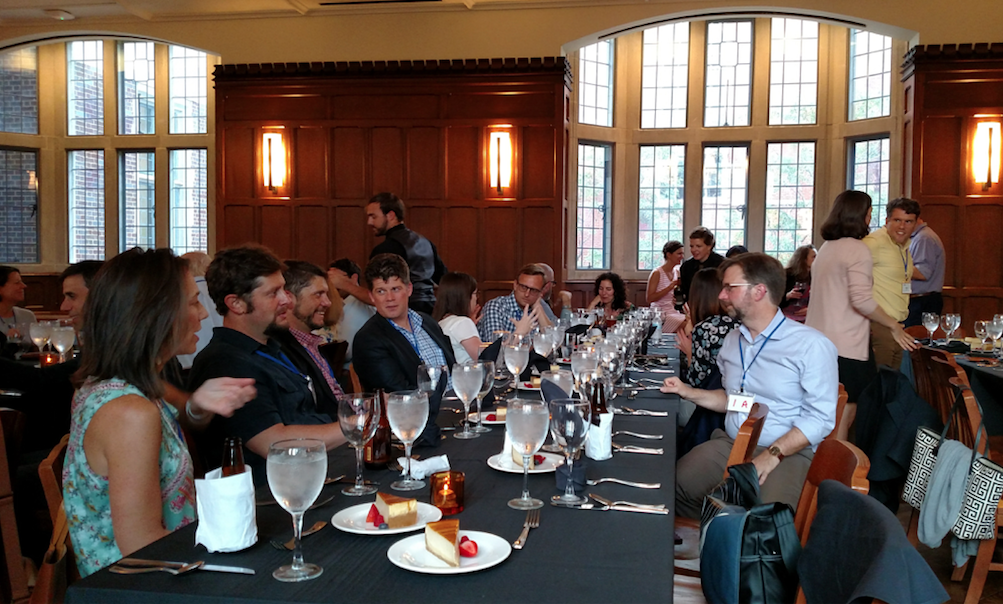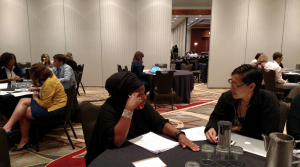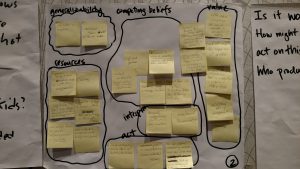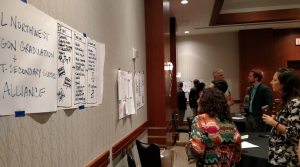A program of the Kinder Institute for Urban Research at Rice University
RESEARCH-PRACTICE PARTNERSHIPS, long-term mutually beneficial
formalized collaborations between education researchers and practitioners,
are a promising strategy for producing more relevant research,
improving the use of research evidence in decision making,
and engaging both researchers and practitioners to tackle problems of practice.
Although promising, research-practice partnerships are challenging to create and difficult to maintain.
NNERPP aims to develop, support, and connect research-practice partnerships in education to improve their productivity.




NNERPP is a professional learning community for RPPs working in education.
We currently have 77 members in our network, reflecting a wide variety of approaches to the work.
The NNERPP RPP Knowledge Clearinghouse contains a curated collection of resources to help you with your education RPP efforts.
The 2025 NNERPP Annual Forum is taking place July 23-25 in St. Louis, MO! The theme will be: “Meeting the Moment: Connection, Collaboration, and Creativity for the Long Term.” To register for the Forum, please use this form. Early registration ends June 15, 2025. We look forward to seeing you there!
ANNOUNCEMENTS
NNERPP Yearbook
We are excited to share the 2025 NNERPP Yearbook with you! The NNERPP Yearbook is a celebration of our members’ amazing RPP efforts for 2025 as well as our shared collaborative activities within NNERPP.
At the heart of the Yearbook are stories of RPP impact shared by our members, guided by the question: What has changed as a result of the RPP this year (2025)? The stories are as varied as the RPPs themselves — you will find stories about partnerships building new relationships, expanding work into new areas, undertaking pivots, supporting new groups of students, informing policy… and much more!
We invite you to explore the 2025 NNERPP Yearbook here and share it with anyone in your networks interested in learning more about what RPP work can look like! You can explore all previous Yearbooks and reports here. We are immensely thankful to all our members who joined us this year in bringing together the details of the NNERPP Yearbook.
 NNERPP Youth Voice for RPPs Awards Program
NNERPP Youth Voice for RPPs Awards Program
Applications for NNERPP’s awards program “Youth Voice 4 RPPs” are now open! This program honors and supports new or existing RPP efforts that demonstrate youth involvement in the RPP. Through a simple application process, three NNERPP member RPPs will be selected for awards of up to $7,500 to further develop or strengthen youth involvement across the research process.
We have seen amazing youth voice efforts come to life or grow in previous rounds of the program and are thrilled to now open applications again.
Applications are due January 30, 2026.
You can learn more about the eligibility requirements, award timeline, and review criteria on this flyer and apply here (NNERPP members only).
EduDream
-
Mixed-Methods Research and Evaluation Associate [added 12/10/25]
HEDCO Institute for Evidence-Based Educational Practice
- Postdoctoral Scholar [added 12/3/25]
Illinois Workforce and Education Research Collaborative (IWERC)
- Visiting Senior Research Specialist [added 11/18/25]
Overdeck Family Foundation
- Senior Associate, Research and Impact [added 11/4/25]
Boston Public Schools
- Assessment Manager [added 9/30/25]
Education Policy Innovation Collaborative (EPIC)
- Research Specialist [added 10/22/25]
Metropolitan Nashville Public Schools
- Advisor Partnership Research Program II [added 10/8/25]
The Research Alliance for New York City Schools
- Data Manager [added 9/23/25]
Tulane University
San Francisco Unified School District
-
Deputy Superintendent, Educational Services & School Operations [added 6/10/25]
VOLUME 1
VOLUME 2
VOLUME 3
VOLUME 4
VOLUME 5
VOLUME 6
VOLUME 7
VOLUME 8
CONTACT
NNERPP
Kinder Institute for Urban Research
Rice University
6100 Main St. MS-258
Houston, TX 77005-1827
ACKNOWLEDGEMENTS
NNERPP is made possible through generous funding provided by: